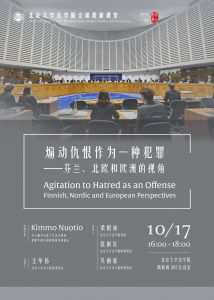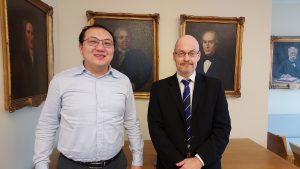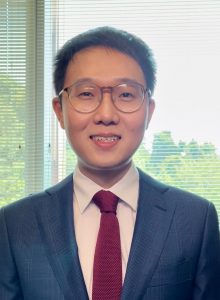On 21 May 2024, the hybrid seminar on the topic of ‘Law, Economy and Development’ will take place at 13:15 – 15:45 Helsinki time, at Lecture Hall F3006, Main Building of the University of Helsinki, Fabianinkatu 33. The event is jointly organized by the Rule of Law Center and the Finnish China Law Center, with the financial support of Jenni and Antti Wihuri Foundation and Tiina and Antti Herlin Foundation.
The seminar programme can be found here.
The event is free and open to all. Zoom link for the event will be sent to registered online participants.
We kindly ask you to register by 6 May by completing the following electronic form:
https://www.lyyti.in/Law_Economy_and_Development_8080
Background of the presentations
Capitalising on Sustainability: Behind the Rise of ESG
ESG is enthusiastically embraced, accompanied by legal efforts to guide ESG reporting practices, facilitate the national implementation of ESG disclosure, and embed ESG into corporate governance. As much as it reflects a genuine move towards environmental and social sustainability, this article argues that legal actions facilitating ESG will never fulfil the promises of ESG betterment, for these legal actions consolidate the underlying rationale of ESG investment, prioritising financial returns over any other considerations. By unravelling the underlying rationale of ESG investment, the paper not only questions the current enthusiasm over ESG investment and the flourishing of legal actions in pursuit of ESG but also uncovers the distributive effects of these legal actions. To put it differently, if we view the law not as the promoter and facilitator of ESG betterment but as the constitutive force of ESG practices, who might benefit from these legal mechanisms behind the flowery banner of ESG?
Historical Perspectives on Property Rights and Economic Development in Russia and the Soviet Union
Russian history provides social scholars with multiple opportunities to explore the effect of property rights on economic development. Indeed, over the last two centuries, the country saw such radical institutional reforms as the emancipation of serfs, nationalization of major productive assets by the Communists, and massive privatization after the collapse of the Soviet Union. A long history of insecure property rights is one of the explanations for the Russian relative economic underperformance. However, historical evidence of private property as a sufficient condition for higher economic efficiency and sustainable development is mixed. In the talk, I review recent empirical literature on the consequences of Russian historical property rights reforms for economic development. I also discuss how history could cast a long shadow shaping popular attitudes toward private property.
About the speakers
 Kangle Zhang is an Assistant Professor at Peking University Law School in Beijing, China. Kangle obtained the Doctor of Laws degree from the University of Helsinki in 2020. Kangle’s research targets the linkages between international law and the economy, focusing on issuing ranging from economic inequality and financial market operations, corporations in international law, environmental protection in economic development, to human right to development.
Kangle Zhang is an Assistant Professor at Peking University Law School in Beijing, China. Kangle obtained the Doctor of Laws degree from the University of Helsinki in 2020. Kangle’s research targets the linkages between international law and the economy, focusing on issuing ranging from economic inequality and financial market operations, corporations in international law, environmental protection in economic development, to human right to development.
 Andrei Markevich is University Lecturer at the University of Helsinki (Finland) and Professor (on leave) at the New Economic School (Moscow, Russia). He studies the economic history of Russia, Eastern Europe, and North Eurasia. The development of the Russian Empire and the Soviet Union in the 18th – 20th centuries is at the center of my research. He focuses on the interconnections between institutions and economic growth, the political economy of state socialism, and the long-run consequences of history.
Andrei Markevich is University Lecturer at the University of Helsinki (Finland) and Professor (on leave) at the New Economic School (Moscow, Russia). He studies the economic history of Russia, Eastern Europe, and North Eurasia. The development of the Russian Empire and the Soviet Union in the 18th – 20th centuries is at the center of my research. He focuses on the interconnections between institutions and economic growth, the political economy of state socialism, and the long-run consequences of history.
















